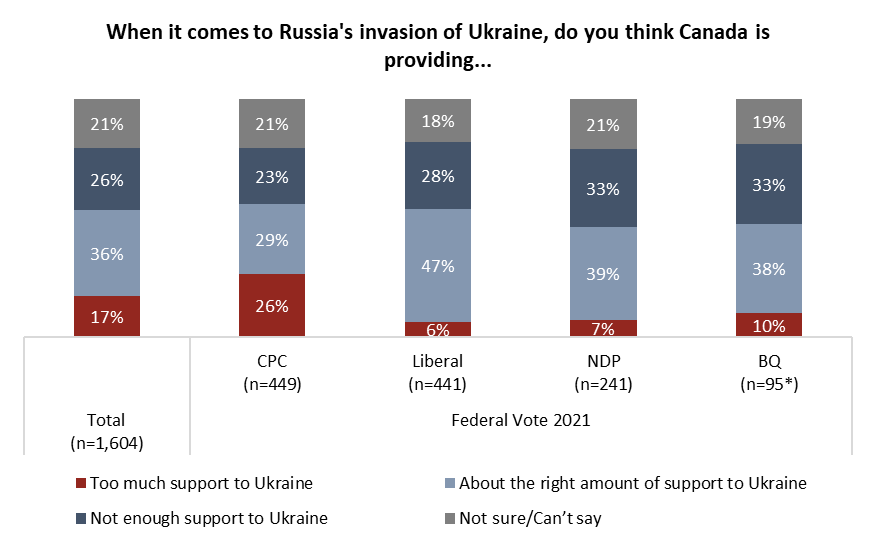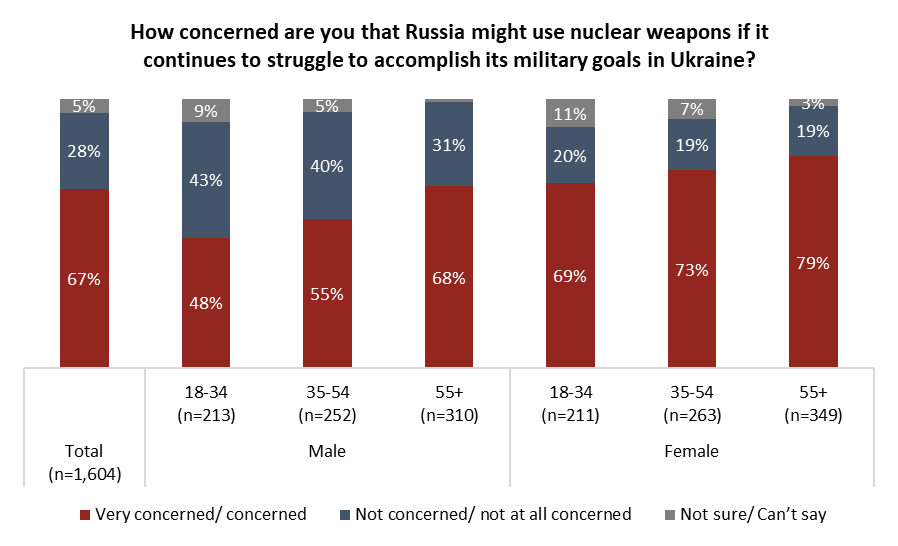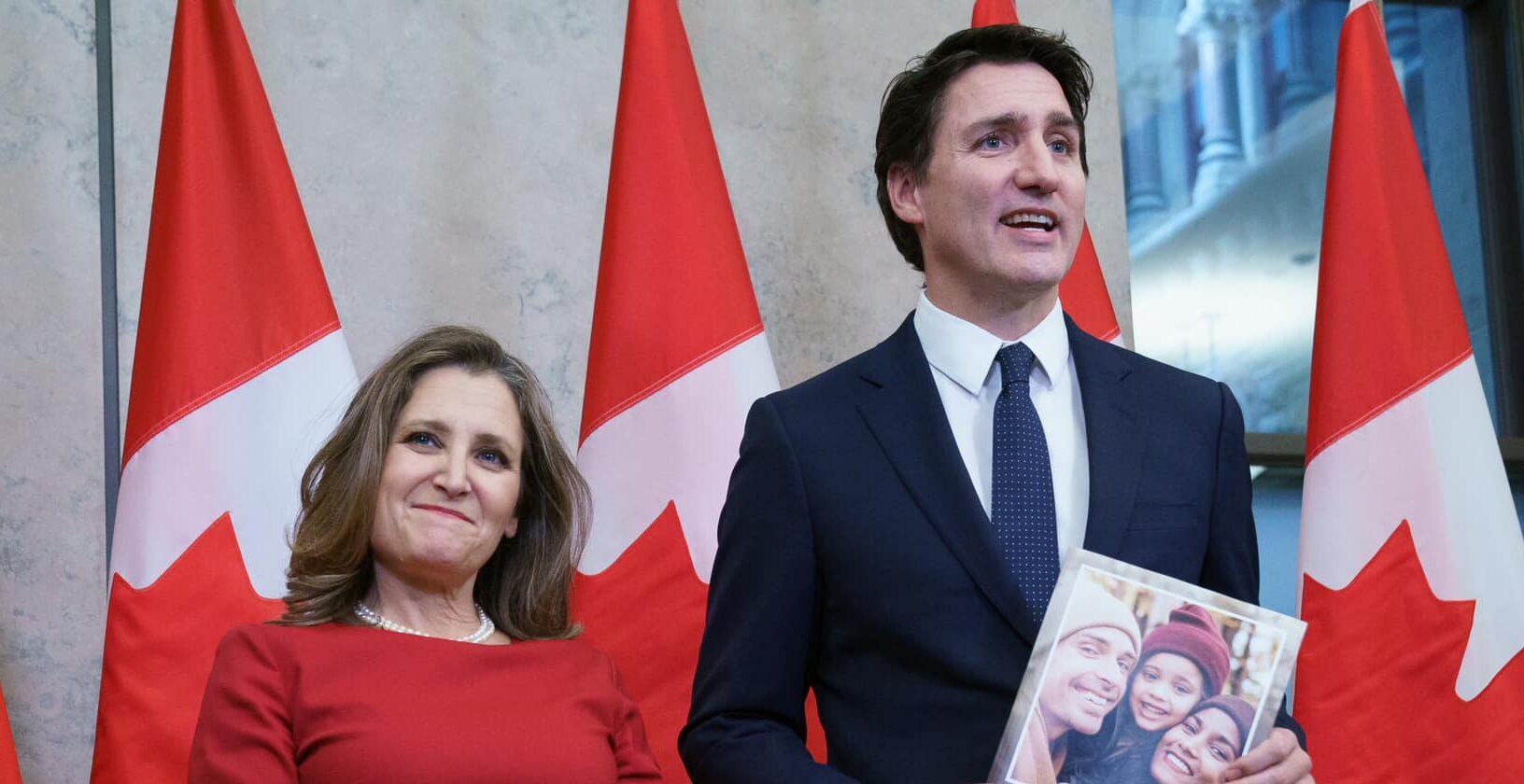Support for Canada providing military aid declines from earlier in war – especially among past CPC voters
February 22, 2023 – One year into Russia’s invasion of Ukraine, new data from the non-profit Angus Reid Institute finds Canadians more inclined to see its ally pursue the path of persistence.
Indeed, half of Canadians say Ukraine should continue fighting, though they’re divided about whether the goal should be a reclamation of its eastern provinces (23%) or all of its previous territory including Crimea (32%). One-quarter (23%) would prefer negotiations. Initial peace talks took place in April of last year but have not reignited since. Ukraine President Volodymyr Zelenskyy said recently that the path to ending the war is Russian retreat.
Canada’s role in supporting Ukraine continues to be a source of enthusiasm for most, though a year of conflict is leading to attrition.
Half of Canadians (52%) still support Canada providing Ukraine with defensive weapons and gear and intelligence and cybersecurity (50%), but this support has declined significantly since March 2022 – by nine and 11 points, respectively. Two-in-five (37%) are on board with sending more lethal aid to support Ukraine, however, that too has declined by 11 points since the early days of the war.
Asked how long Canada should continue to offer military and financial supports, 39 per cent say for as long as it takes, and one-in-ten say they would end assistance after another year (10%). The other half of Canadians are either unsure (26%) or say Ukraine should pursue negotiations to end the war now (23%).

More Key Findings:
- Ahead of a March 31 expiration of the special immigration program for Ukrainians – which allows an unlimited number of those seeking refuge to live and work in Canada for three years – three-quarters of Canadians (75%) would extend this program.
- One-in-five Canadians (18%) say they have donated to Ukrainian assistance programs in recent months. This is down from 27 per cent who said the same in May 2022.
- Two-thirds (67%) express concern that Russia could use nuclear weapons if it continues to struggle to achieve victory in Ukraine.
About ARI
The Angus Reid Institute (ARI) was founded in October 2014 by pollster and sociologist, Dr. Angus Reid. ARI is a national, not-for-profit, non-partisan public opinion research foundation established to advance education by commissioning, conducting and disseminating to the public accessible and impartial statistical data, research and policy analysis on economics, political science, philanthropy, public administration, domestic and international affairs and other socio-economic issues of importance to Canada and its world.
INDEX
Part One: Supporting Refugees
-
Fewer Canadians say they’re donating money to Ukraine in recent months
-
Three-quarters support renewing fast-track visa for Ukrainians
Part Two: Canada’s efforts
-
Support for lethal, defensive aid wanes
-
Desire for Canada to do more declines
Part Three: The future of the conflict
-
Majority want Ukraine to continue fighting, one-quarter say it should negotiate peace
-
Two-in-five support Canada providing military assistance for ‘as long as it takes’
-
Two-thirds worry war could go nuclear if Russia continues to struggle
-
Majority support Ukraine joining NATO, though minority in opposition has grown
Part One: Supporting Refugees
One year of conflict brought on by Russia’s invasion of Ukraine has taken a terrible human toll. By some estimates, as many as 180,000 Russian soldiers and 100,000 Ukrainian soldiers have been killed or wounded. There have also been as many as 30,000 civilian deaths, in addition to the millions whose lives have been disrupted. Though the war is concentrated now in Ukraine’s south and eastern regions, after early days where it reached as far as the country’s central capital of Kyiv, more than five million Ukrainians are displaced within their own country because of the war. Another eight million left Ukraine, including more than 130,000 who have come to Canada.
Fewer Canadians say they’re donating money to Ukraine in recent months
For many Canadians, it was this human cost to the conflict that led them to post messages of support for Ukraine on social media, donate money, attend rallies, or help a refugee family get settled in Canada. Overall, two-in-five (42%) Canadians say they have done at least one of the above in recent months. That represents a decline from the near half (47%) who said they did one of the same in May of last year. This decline is especially notable among self-reported donations. In the early months of the war, one-quarter (27%) said they donated money. One-in-five (18%) say the same now.
Older Canadians continue to be the most likely to have done something recently to support Ukraine overall, with one-quarter (24%) of women over the age of 54 reporting they donated money in the past few months:

Support from residents of most regions of the country has dropped, though half of British Columbians have contributed in some way – the only region of the country where this is still the case. In May 2022, half of residents in Alberta, Manitoba, Ontario and Atlantic Canada, had also done so.
Three-quarters support renewing fast-track visa for Ukrainians
Early in the war, Canada committed to bringing in an “unlimited number” of Ukrainian refugees. The federal government created a program which allowed Ukrainians and their immediate family members to stay in Canada for up to three years on accelerated visas. Notably, even before this program, Canada was home to the largest diaspora of Ukrainian people outside of Ukraine and Russia. That initiative was supported by four-in-five Canadians at the time.
However, that program – titled the Canada-Ukraine authorization for emergency travel (CUAET) – is set to end March 31. Three-quarters (75%) would like to see the program continue. One-in-eight (14%) oppose extending the CUAET, including approaching one-in-five (18%) in Ontario, where opposition is highest:

Past Conservative voters support extending CUAET at a majority level (66%), but are more likely than other partisans to voice opposition at one-in-five (21%):

*Smaller sample size, interpret with caution
Part Two: Canada’s efforts
Since the war began, Canada has provided over $1 billion in military support to Ukraine. It has also provided $320 million in humanitarian assistance, while levying economic sanctions against Russian businesses and individuals. Canada has banned the import and export of some goods from and to Russia, as well as instituting a price cap on barrels of oil sold from Russia.
Support for lethal, defensive aid wanes
One year into the conflict, enthusiasm for many measures taken by Canada is waning. Support for providing humanitarian aid, defensive equipment, and more lethal aid to Ukraine, as well as intelligence and cybersecurity cooperation, and broader economic sanctions against Russia have all declined by at least eight points since March 2022.
This decline in support appears to be driven by political preference. Those who voted Conservative in the 2021 federal election are most likely to be less supportive of many of the measures, including sending “lethal aid” to Ukraine to help in their fight against Russia which has dropped by 20 points (51% to 31%):
*Smaller sample size, interpret with caution
Desire for Canada to do more declines
Canada has continued to provide support to Ukraine as the war has dragged on. Most recently, the government committed to send four “battle-ready” Leopard 2 tanks from its inventory of 112 bought for the war in Afghanistan. Foreign Affairs Minister Mélanie Joly announced $21 million in funding to fight sexual violence and help demining efforts during a visit to Ukraine on the eve of the one-year anniversary of the invasion.
One-third (36%) of Canadians say Canada has provided the right amount of support to Ukraine. One-quarter (26%) want the federal government to do more, fewer than the number seen in July (36%):

Regionally, Ontarians and Albertans are most likely to say that Canada is offering too much aid to Ukraine, while Atlantic Canadians are most likely to say aid is insufficient:

One-quarter (26%) of past Conservative voters believe the government is doing too much to help Ukraine. Few of those who voted Liberal (6%) or NDP (7%) in 2021 agree:

*Smaller sample size, interpret with caution
Part Three: The future of the conflict
There appears to be no end in sight for the war between Russia and Ukraine. There were initial peace talks in April last year, but none since. Russia has indicated more openness to the concept than Ukraine has – Ukraine President Volodymyr Zelenskyy told Sky News in January he was not interested in peace talks. Instead, he said “if they leave our territory the war will stop.”
Majority want Ukraine to continue fighting, one-quarter say it should negotiate peace
More than half (55%) of Canadians want Ukraine to keep fighting the war against Russia. That group is split between those who believe the war should end when Ukraine reclaims its eastern provinces (23%) and those who say instead it should end when Ukraine also drives Russia from Crimea (32%), which Russia annexed in 2014. One-quarter (23%) would prefer an end to the war now through peace talks.
Three-in-ten (29%) of those who voted CPC in 2021 prefer Ukraine to begin peace negotiations now rather than keep fighting. They do so at double the rate of past Liberal (15%) and NDP (12%) voters:

Two-in-five support Canada providing military assistance for ‘as long as it takes’
Canadians who believed Ukraine should keep up the fight against Russia were then asked how long Canada should continue to support Ukraine with military assistance. Two-in-five (39%) Canadians believe that if Ukraine continues to fight Russia, Canada should provide military support for “as long as it takes.” A further 10 per cent are willing to keep the supply of lethal aid flowing but only for another year. Past Liberal and NDP voters are much more supportive of Canada supplying Ukraine indefinitely than those who voted Conservative in 2021:

Two-thirds worry war could go nuclear if Russia continues to struggle
While Russia has made some battlefield gains in recent weeks, they have come at an immense human cost. As Russia struggles to accomplish its military goals, there is renewed concern it could turn to nuclear weapons.
Two-thirds (67%) of Canadians say that prospect concerns them. Three-in-ten (28%) are not as worried, including two-in-five men under the age of 55:

Majority support Ukraine joining NATO, though minority in opposition has grown
There have been some overtures, but little movement towards making Ukraine a member of North Atlantic Treaty Organization (NATO), a military alliance which includes Canada, the United States and some of Ukraine’s neighbours including Poland. Prior to the invasion, Russia demanded a guarantee that Ukraine could never join NATO.
Polish President Andrzej Duda said his country wants NATO to make “security guarantees” for Ukraine after the war is over, including a legally binding deal to provide advanced military technology, similar to the agreement between Israel and the United States. But he stopped short of advocating NATO make Ukraine a member, as Sweden and Finland apply to join the alliance, expanding NATO’s shared border with Russia. Russia has threatened “retaliatory steps, both of a military-technical and other nature” if Finland were to join the alliance.
Seven-in-ten (68%) Canadians support Ukraine joining NATO, identical to the level of support in this country seen before Russia’s invasion. However, while still in the minority, twice as many Canadians (7% vs. 13%) believe Ukraine should not be allowed into the alliance (see detailed tables).
Survey Methodology:
The Angus Reid Institute conducted an online survey from Feb. 16 – 20, 2023 among a representative randomized sample of 1,604 Canadian adults who are members of Angus Reid Forum. For comparison purposes only, a probability sample of this size would carry a margin of error of +/- 2 percentage points, 19 times out of 20. Discrepancies in or between totals are due to rounding. The survey was self-commissioned and paid for by ARI.
For detailed results by age, gender, region, education, and other demographics, click here.
To read the full report, including detailed tables and methodology, click here.
To read the questionnaire in English, click here.
Image – EPP Group/Flickr
MEDIA CONTACT:
Shachi Kurl, President: 604.908.1693 shachi.kurl@angusreid.org @shachikurl
Dave Korzinski, Research Director: 250.899.0821 dave.korzinski@angusreid.org





